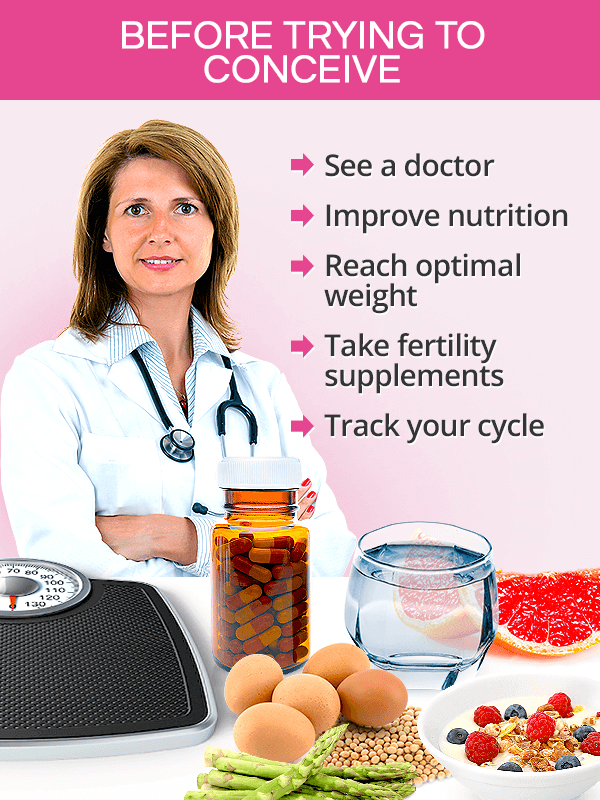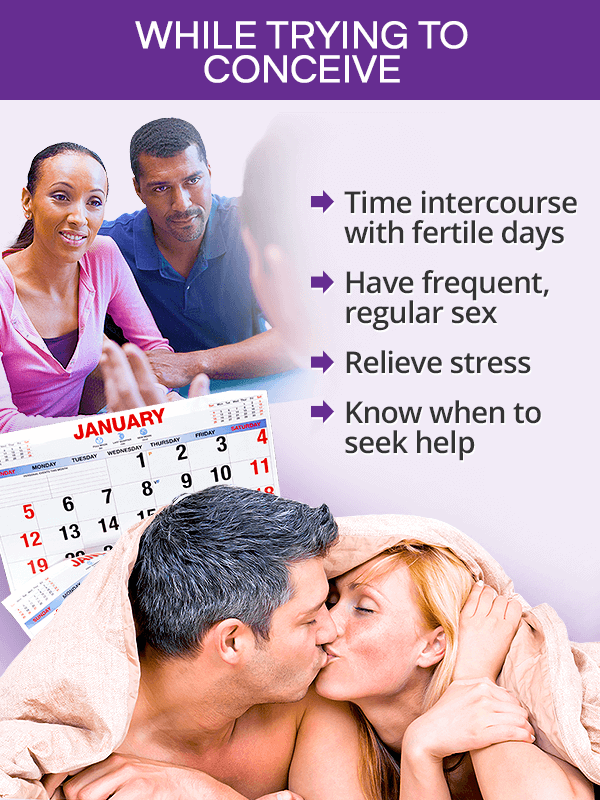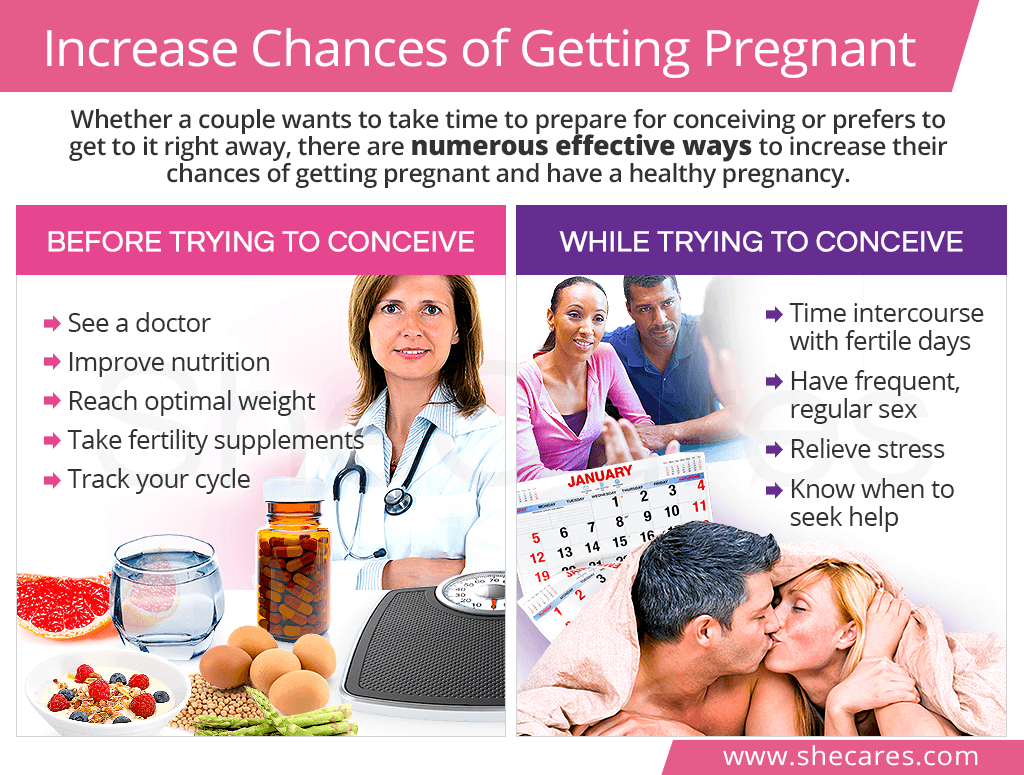Improve Pregnancy Chances Before Trying

Studies have shown that couples who make an effort in preparing for pregnancy three to six months ahead of time can significantly increase chances of conceiving and drastically reduce the risk of pregnancy complications.
The best approaches to pre-pregnancy preparations include the following:
Scheduling a Doctor's Check-Up
Once a couple decides to get pregnant, one of the most beneficial ways to increase chances of pregnancy is to schedule a medical appointment, both with a general doctor and a gynecologist.
A preconception check-up gives women a chance to manage their health conditions before getting pregnant, such as diabetes, thyroid disease, or endometriosis. It is also a good time to seek help with addictions to alcohol, tobacco, or illicit drugs, whose abstinence can improve chances of conception and a healthy pregnancy.
Improving Nutrition
Certain nutritional deficiencies can lead to hormonal imbalance and deregulate the menstrual cycle, thus making conception more challenging.
While most women can get all the nutrients they need to improve chances of conception by following a fertility diet, some will need to take supplements to obtain all the essential pre-pregnancy vitamins and minerals. Adding 400 mcg of folic acid at least a month before getting pregnant can greatly decrease the risk of birth defects during pregnancy.
Reaching Optimal Weight
Since obesity is one of the leading factors contributing to ovulation problems behind infertility, putting in an effort to reach a healthy body mass index (BMI) can be an effective way to increase chances of getting pregnant.
Also, besides following a balanced and nutritious diet, fitting fertility exercise into one's schedule can be a method to shed pounds in a safe and healthy way. Studies have shown that a 5-10% reduction in body mass is oftentimes enough to restore ovulation and improve chances of pregnancy.
Taking Fertility Supplements
Without balanced hormones, the entire menstruation process does not run as smoothly as it should, potentially lowering a woman's chances of getting pregnant throughout the cycle.
Fertility supplements, including fertility-boosting herbs, can help women conceive faster. They consist of phytoestrogenic supplements, like chaste berry, containing estrogen-like compounds that fill in the hormonal gap, and hormone-regulating supplements, like Macafem, which safely stimulate the endocrine glands to up their hormone production.
Tracking the Cycles
Understanding one's menstrual patterns, particularly ovulation and the fertile window, are among the best ways to increase chances of getting pregnant.
Women can use ovulation tests, like checking cervical mucus or using ovulation test kits, for at least three cycles to learn to detect hormonal changes that happen as ovulation approaches. Tracking one's most fertile days with ovulation predictors, like ovulation calculators or monitors, will be highly important once a couple begins trying to conceive.
Improve Conception Chances While Actively Trying

Whether a couple has dedicated time to pre-pregnancy planning or want to get to it right away, there several crucial ways to increase chances of getting pregnant while they are actively trying.
The following recommendations are worth considering as they can transform the baby-making efforts into more productive and less stressful endeavor:
Timing it Right
This is when prior menstrual cycle tracking pays off. Women who know how to estimate their ovulation have much higher chances of conceiving than those who do not know when their fertile window occurs.
The fertile window starts three to five days before ovulation and ends about 24 hours after the egg has been released. Those six days a month are the only time to get pregnant. Because the egg is short lived, and the sperm can only survive in the reproductive tract for up to five days, having sex outside the fertile window is not likely to result in conception.
Having Frequent Sex
Although timing intercourse to the fertile window is key to getting pregnant faster, couples are encouraged to have frequent sex spread regularly throughout the cycle, instead of just limiting it to ovulation.
Being intimate every two to three days guarantees that intercourse will take place during a woman's fertile days. This approach is favored by many women who find intercourse timing stressful or who have irregular periods and irregular ovulation. Experimenting with various sex positions to get pregnant might make frequent intimacy even more attractive.
Managing Stress
Stress is a recognized factor disrupting hormonal balance and inhibiting ovulation, and couples amidst conception trials are more prone to stress and tension.
Investing time in stress relief and promoting mindfulness are some of the best, yet often neglected, ways to increase chances of pregnancy. Alternative therapies for fertility, like acupuncture, yoga, and meditation, have been shown to decrease cortisol levels, promote mind clarity, and increase blood flow to the reproductive organs to improve fertility.
Knowing When to Seek Help
Although up to 96% of young and healthy couples successfully conceive within a year, a small percentage of aspiring parents does not and is, therefore, advised to undergo infertility evaluations.
As such, knowing when it is time to seek help getting pregnant can greatly increase chances of conceiving. Women who are younger than 35 are told to try for 12 consecutive months before seeking help, while those older than 35 should do so after 6 months of unfruitful trying.
Key Takeaways
Without a doubt, conceiving a baby can be a time-consuming and challenging process for many couples. Luckily, there are numerous ways in which aspiring parents can take control over their fertility and assume a proactive approach to increase their chances of pregnancy.
The best results are seen when a woman takes time, preferably three to six months, to plan and prepare for conception by managing her ongoing conditions, improving weight and nutrition, boosting fertility with supplements like Macafem, and tracking her cycles to estimate ovulation. However, those who do not want or do not have time for prior preparations still have numerous ways to increase chances of getting pregnant at their disposal. They include timing intercourse to a woman's fertile window, having frequent and regular sex, and managing stress through natural therapies for optimal fertility and a healthy pregnancy.
Sources
- American Pregnancy Association. (n.d.). How to Get Pregnant Naturally. Retrieved March 11, 2019 from https://americanpregnancy.org/naturally/get-pregnant-naturally/
- American Pregnancy Association. (2010). The Essential Guide to Getting Pregnant. Retrieved March 11, 2019 from http://americanpregnancy.org/getting-pregnant-ebook/p7M7O0q1c71703C/gettingpregnant.pdf
- Cleveland Clinic. (2019). Pregnancy: Ovulation, Conception & Getting Pregnant. Retrieved March 11, 2019 from https://my.clevelandclinic.org/health/articles/11585-pregnancy-ovulation-conception--getting-pregnant
- Healthy Women. (n.d.). 4 Tips to Help You Get Pregnant. Retrieved March 11, 2019 from https://www.healthywomen.org/content/article/4-sex-tips-help-you-get-pregnant
- Mayo Clinic. (2016). How to get pregnant. Retrieved March 4, 2019 from https://www.mayoclinic.org/healthy-lifestyle/getting-pregnant/in-depth/how-to-get-pregnant/art-20047611
- National Health System. (2018). How Can I Increase my Chances of Getting Pregnant? Retrieved March 11, 2019 from https://www.nhs.uk/common-health-questions/pregnancy/how-can-i-increase-my-chances-of-getting-pregnant/


